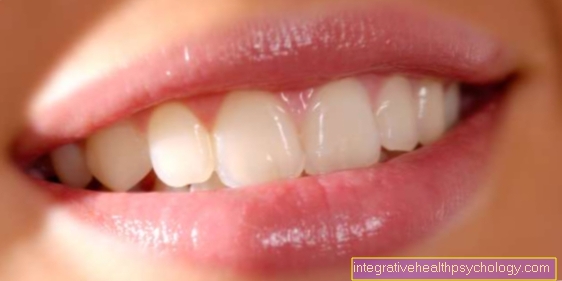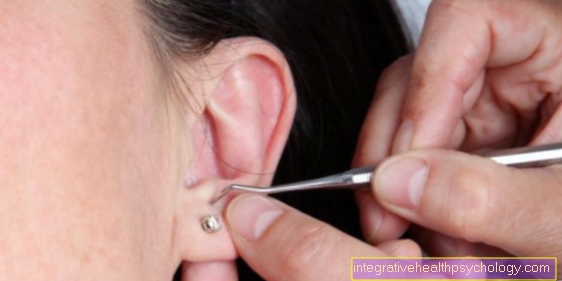Dexa-gentamicin eye ointment
introduction
Dexa-gentamicin eye ointment is one of the popular drugs in ophthalmology that is prescribed for inflammatory and allergic reactions in the eye and for bacterial eye infections. The eye ointment is also available in the form of eye drops.
In the following you will find out more about the area of application, the counter-signs and warnings as well as other special features relating to the Dexa-Gentamicin eye ointment.
If you are interested in the eye drops, also read: Dexa-gentamicin eye drops

Indications for the Dexa-Gentamicin eye ointment
Dexa-gentamicin eye ointment is often prescribed for eye infections caused by bacteria that are sensitive to gentamicin, provided there are no signs to the contrary.
According to the manufacturer, Dexa Gentamicin can be used for:
- Inflammation of the conjunctiva
- Inflammation of the cornea
- Inflammation of the edge of the eyelid
- Stye
But since Dexa-Gentamicin also contains the active ingredient dexamethasone, it is also effective against allergic inflammation of the anterior segment of the eye. The eye ointment can be used particularly well if there is also a bacterial infection.
The Dexa Gentamicin eye ointment is therefore mainly prescribed for inflammation in the eye. Find out more about the symptoms and clinical pictures caused by eye infections: Inflammation of the eye
The Dexa Gentamicin eye ointment is also available in drop form. Read more about this at: Dexa gentamicin eye drops
Dexa-gentamicin eye ointment for conjunctivitis
The Dexa-Gentamicin eye ointment can help with conjunctivitis, as this is often caused by bacteria.
With conjunctivitis, the eyes are usually red, they water, burn, itch, and are often sticky and festering. In addition, there is often an increased sensitivity to light.
Read more on this topic at:
- How to recognize conjunctivitis!
- Treatment of conjunctivitis
- Eye drops for conjunctivitis
Active ingredients of the Dexa-Gentamicin eye ointment
The Dexa-Gentamicin eye ointment contains dexamethasone and gentamicin sulfate as active ingredients.
Gentamicin is an antibiotic. It therefore requires a prescription and is primarily effective against eye infections with gentamicin-sensitive bacteria. Gentamicin is broad-acting, which means that it can work against many types of bacteria.
Another active ingredient in the eye ointment is dexamethasone. This belongs to the glucocorticoids, like cortisone. It has anti-inflammatory effects and also dampens the immune system. In this way, it works primarily against allergic and also inflammatory processes in the eye.
Other components of the Dexa-Gentamicin eye ointment are white vaseline, viscous paraffin and wool wax, in order to make the application of the eye ointment as pleasant as possible.
Read more about the active ingredients of the Dexa Gentamicin eye ointment at: The antibiotic gentamicin and Dexamethasone - artificial cortisone
When should the dexa gentamicin eye ointment not be used?
You should not use the Dexa-Gentamicin eye ointment if you have allergies to one of the active ingredients dexamethasone and gentamicin sulfate.
If you have injuries to the external eye, such as corneal injuries or superficial herpes infections on the eye, you should by no means use the eye ointment.
Further counter-signs are fungal diseases of the eye, tuberculosis of the eye and an increase in intraocular pressure (glaucoma).
Are there any side effects from the Dexa Gentamicin eye ointment?
As with all other medications, the use of Dexa Gentamicin eye ointment can lead to side effects.
These include:
- allergic reaction of the eye with burning sensation, itching, swelling of the eye, blistering of the eyelid
- Increased intraocular pressure with headache, with prolonged use
- Lens opacities, especially after prolonged use with children
- Damage to the cornea: This in turn can promote further infections with bacteria, viruses and fungi and lead to wound healing disorders in the eye
However, these side effects are very rare, affecting about 1 in 100,000 people. They usually improve after the end of therapy with the eye ointment. In principle, it is recommended not to use the eye ointment for longer than two weeks.
You might also be interested in: Dexa gentamicin eye drops
Interaction with other drugs
In principle, you should inform your doctor about any other medication you are taking. It can happen again and again that taking certain drugs at the same time is not compatible.
Dexa-gentamicin eye ointment can cause cloud-like precipitation on the conjunctiva if it is used at the same time as amphotericin B, sulfadiazine, heparin, cloxacillin and cephalotin.
Is the Dexa-Gentamicin eye ointment compatible with alcohol?
Since the Dexa gentamicin eye ointment contains the antibiotic gentamicin, interactions should be reconsidered.
In principle, however, it can be said that gentamicin is one of the antibiotics that go well with alcohol. Since the drug is also applied to the eye in the form of an ointment, only a small proportion of the active ingredient gets into the body. Interactions with alcohol can therefore be neglected.
Is it possible to take it during pregnancy and breastfeeding?
You should definitely inform your doctor about this if you wish to become pregnant. It is important to tell your doctor if you are already pregnant. The use of Dexa-Gentamicin eye ointment is not permitted, especially in the first 12 weeks of pregnancy. Use in the further course of pregnancy may be considered.
Dexa gentamicin eye ointment is also not recommended during breastfeeding, as the dexamethasone can be passed on to the child through breast milk. However, there are no reliable sources to support this assumption. It is therefore always advisable to consult your doctor.
From what age can the Dexa Gentamicin eye ointment be used?
There is no known age limit for the Dexa Gentamicin eye ointment. It is suitable for every age group.
In children, however, you should make sure that the eye ointment is not used for too long, as lens opacity can very rarely occur.
Is the Dexa-Gentamicin eye ointment available without a prescription?
Since the Dexa-Gentamicin eye ointment contains the antibiotic gentamicin, it is only available on prescription. It cannot be bought without a prescription. First, the doctor looks at whether it is necessary to use the Dexa Gentamicin eye ointment and whether there are any counter-signs for its use.
Also read: Dexa gentamicin eye drops
Cost of Dexa-Gentamicin eye ointment
The Dexa Gentamicin eye ointment is usually available as a 2.5 gram pack. The price can vary, but is around 12-14 euros.
Dosage of the Dexa gentamicin eye ointment
If your doctor or pharmacist has not given you any information about the dosage, the Dexa Gentamicin eye ointment should be applied up to three times a day according to the manufacturer's instructions. One centimeter of ointment contains the desired and effective dose of approx. 0.1 mg gentamicin sulfate and 0.006 mg dexamethasone.
What are the alternatives?
Dexa gentamicin eye ointment alternatives include:
- Dexa gentamicin eye drops
- Dexamytrex eye drops
- Dexamytrex combination pack
- Dexamytrex eye ointment
All alternatives contain the active ingredients dexamethasone and gentamicin, but they differ in consistency. In this way, you can individually decide which shape you can best tolerate on the eye.
Read more about: Dexa gentamicin eye drops





























